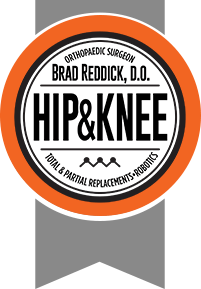 When should I talk to my doctor about hip replacement surgery?
When should I talk to my doctor about hip replacement surgery?
That's a question you and your orthopedic surgeon will have to answer together. When hip pain is so bad it actually interferes with the things you want or need to do, the time may be right. As hip pain progresses, many people have continual pain, loss of mobility, loss of sleep and even pain that seems to increase with weather changes. Hip replacement may be an option when nonsurgical interventions such as medication, physical therapy, and rest have not provided relief.
Your primary care doctor may refer you to us to help you determine when/if it's time for hip surgery and which type of hip surgery is most appropriate. We’ll talk about your health history, personal goals and activities to decide if hip replacement surgery is the best option. We’ll also talk about the things that might make replacement difficult or an inappropriate choice. Infections, excessive bone loss, or bone that is not strong enough to support an artificial hip all reasons to pursue other options. The rule of thumb in the past has been to try to delay total hip replacement for as long as possible in favor of less invasive treatments, however with the advent of new technology and techniques, we’ve been able to help more people with great long-term results. If you have advanced joint disease, hip replacement may offer the chance for relief from pain and a return to normal activities.
How common are hip replacements?
For the past 40 years, millions of people who have suffered from hip pain and arthritis have experienced relief and restored mobility through total hip replacement. In fact, hip replacement and revision surgeries are routine and are performed on nearly one million people worldwide each year.
How do I get a diagnosis?
To diagnose your condition, we’ll perform a thorough examination of your hip, analyze X-rays, and conduct physical tests. You will be asked to describe your pain, if you suffer from other joint pain, and if you have endured past injuries that may have affected your current hip condition. It may be helpful to keep a record of your hip pain to share with your doctor. Your hip joint will then be tested for strength and range of motion through a series of activities. X-rays and MRIs are used to detect changes and diseases of the hip structure.
Signs that it might be time for a hip replacement:
- Your pain persists or recurs over time
- Your hip aches during and after exercise
- You're no longer as mobile as you'd like to be
- Medication and using a cane aren't delivering enough relief
- Your hip stiffens up from sitting in a car or a movie theater
- You feel pain in rainy weather
- The pain prevents you from sleeping
- You feel a decrease in hip motion or the degree to which you're able to bend
- Your hip is stiff or swollen
- You have difficulty walking or climbing stairs
- You have difficulty getting in and out of chairs and bathtubs
- You experience morning stiffness that typically lasts less than 30 minutes (as opposed to stiffness lasting longer than 45 minutes, a sign of an inflammatory condition called rheumatoid arthritis)
- You feel a "grating" of your joint
- You've had a previous injury to your hip
Dr. Reddick is one of the country’s most experienced robotic hip and knee surgeons. He helped pioneer the technology and puts it to work in his practice every week. 1/2020






